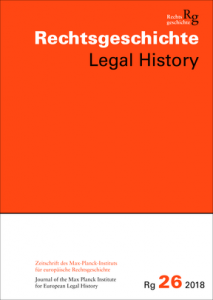For the sake of viewer convenience, the content is shown below in the alternative language. You may click the link to switch the active language.
Text: José Luis Egío
Fotos: Christiane Birr
Del 24 al 26 de octubre tuvieron lugar en la Academia Nacional de la Historia de la República Argentina, sita en Buenos Aires, las Jornadas La Escuela de Salamanca: ¿un caso de producción global de conocimiento?
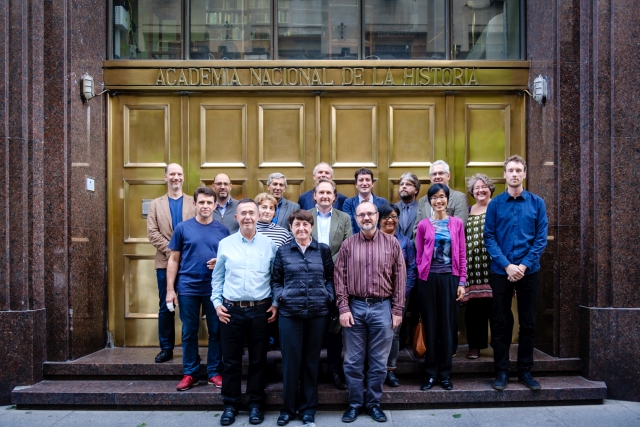
Organizadas por los colaboradores del proyecto La Escuela de Salamanca: una colección digital de fuentes y un diccionario de su lenguaje jurídico-político (co-director Prof. Dr. Thomas Duve, coordinadora PD. Dr. Christiane Birr y Dr. José Luis Egío), las Jornadas reunieron a una veintena de especialistas provenientes de siete países (Alemania, España, Argentina, Brasil, Italia, México y Filipinas). Los participantes presentaron contribuciones sobre la forma en la que los estatutos de la Universidad de Salamanca, métodos docentes, libros o conceptos fundamentales empleados por los maestros salmantinos en las Facultades de Derecho y Teología fueron tenidos en cuenta como referencias insoslayables en muchas de las universidades, colegios y seminarios de la América y Asia coloniales, de tal forma que sería posible hablar de la Escuela de Salamanca como un fenómeno de producción global de conocimiento.
En la sesión inaugural de las Jornadas, el co-director del Instituto Max Planck para la Historia del Derecho Europeo y, asimismo, co-director del proyecto de investigación sobre la Escuela de Salamanca, Thomas Duve, presentó una propuesta metodológica tendente a reescribir la historia de la Escuela de Salamanca desde una perspectiva capaz de combinar la historia del derecho con la historia del conocimiento. Tales consideraciones generales habían sido publicadas unos meses antes en las Working Paper Series del proyecto sobre la escolástica salmantina y enviadas a los participantes en las Jornadas celebradas en Buenos Aires, con el fin de que sirvieran de marco de orientación general para las distintas ponencias.
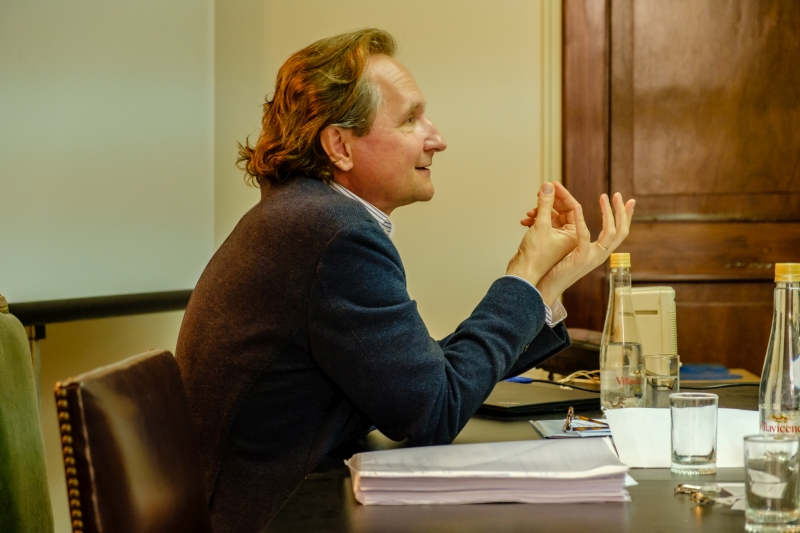
Intentando dar respuesta a la invitación a considerar la forma en la que la producción normativa se llevó a cabo en el seno de la Escuela de Salamanca y la forma en la que estos métodos fueron aplicados en distintas regiones del orbe bajo dominio de las monarquías hispánica y portuguesa entre los siglos XVI y XVIII, los especialistas reunidos en las Jornadas presentaron contribuciones de un amplio espectro temático.
Especialistas en la historia de las Universidades como Enrique González y Adriana Álvarez se concentraron en revisar críticamente la historiografía que habla de las Universidades de la Iberoamérica colonial como meras copias del alma mater salmantina y compararon los estatutos y el funcionamiento habitual de las Universidades de México y Guatemala con los del estudio salmantino. Desde la perspectiva de ambos investigadores, es posible apreciar importantes afinidades entre Salamanca, México y San Carlos de Guatemala, pero también significativas diferencias ligadas al contexto político, económico y social en el que evolucionaron estas Universidades. Por ello, no cabría hablar de un mero trasplante de los estatutos salmantinos al mundo iberoamericano, sino de complejos y, en muchas ocasiones, tumultuosos, procesos de traducción de regulaciones y normatividades.
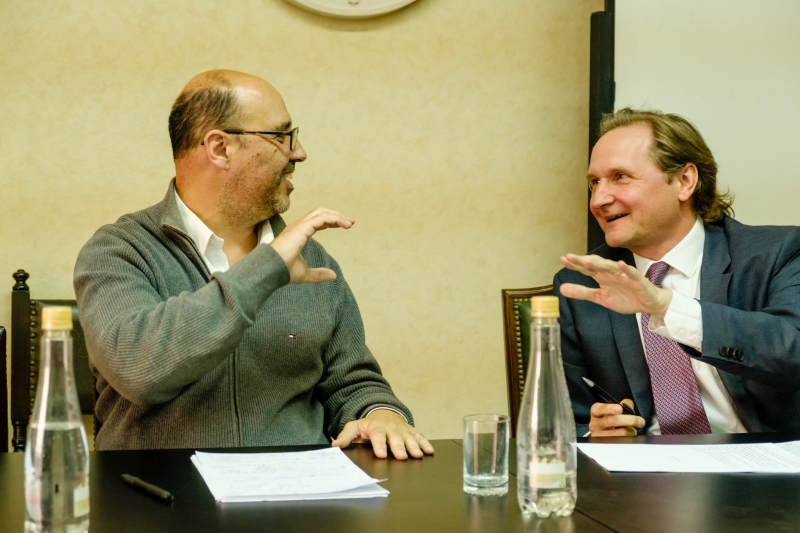
Pasando de esta perspectiva institucional a la comparación del contenido de los cursos dictados en las Facultades de Derecho, Teología o Artes de Salamanca y las Universidades y colegios iberoamericanos, Lidia Lanza, Lúcio Álvaro Marques y Esteban Llamosas ahondaron, asimismo, en los puntos que acercan y separan el tipo de enseñanza ofrecida por la Universidad de Salamanca, las universidades lusitanas de Coimbra y Évora (contribución de Lanza), el Colegio jesuita del Maranhao (Marques) y la Universidad de Córdoba, sita en la actual Argentina (Llamosas). Incidiendo en la gran afinidad existente en el programa y lecturas realizadas por maestros y alumnos, los especialistas subrayaron también los cursos y contenidos específicos que se impartían en cada uno de los centros de estudio mencionados, materias ligadas a las funciones que estaban llamados a desempeñar los estudiantes una vez concluidos sus estudios en contextos muy diversos.
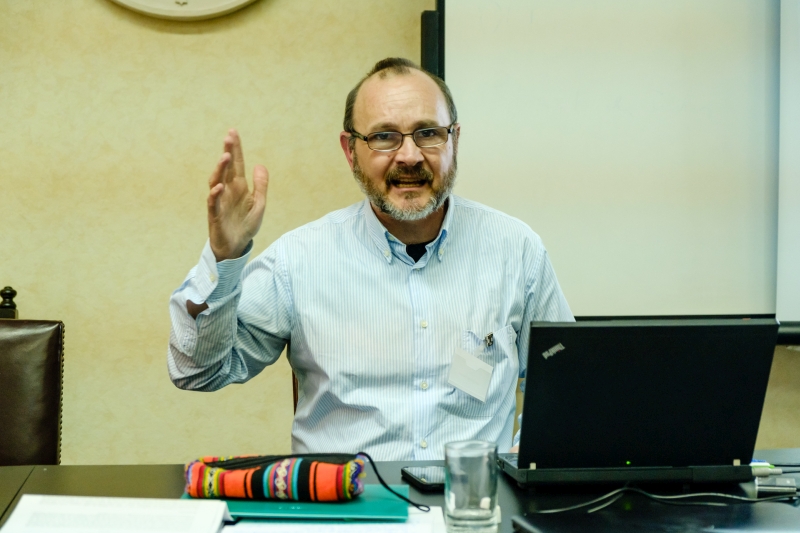
Un tercer bloque temático se concentró en mostrar la forma en la que distintas personalidades formadas en la Universidad de Salamanca jugaron un papel crucial en la conformación de las primigenias instituciones de gobierno e instrucción cristiana en Filipinas. José Antonio Cervera y Osvaldo Moutin subrayaron, desde este perspectiva, la forma en la que misioneros agustinos como Martín de Rada y Juan Cobo y el dominico Domingo de Salazar, primer obispo de Manila, atendieron a asuntos tan diversos como la navegación en el Pacífico, las guerras de conquista, la elaboración de doctrinas y catecismos o el patronato regio teniendo en cuenta, al mismo tiempo, lo que habían aprendido en Salamanca y las circunstancias específicas de un contexto separado de España por dos océanos. Durante sus intervenciones, tanto Cervera como Moutin subrayaron que el contexto de acción de todos estos personajes no se limitó al archipiélago filipino, sino que las Filipinas fueron consideradas durante varias décadas como puerta de entrada a China, habiendo llegado a traducir Juan Cobo algunas doctrinas cristianas en chino y libros morales chinos en castellano.
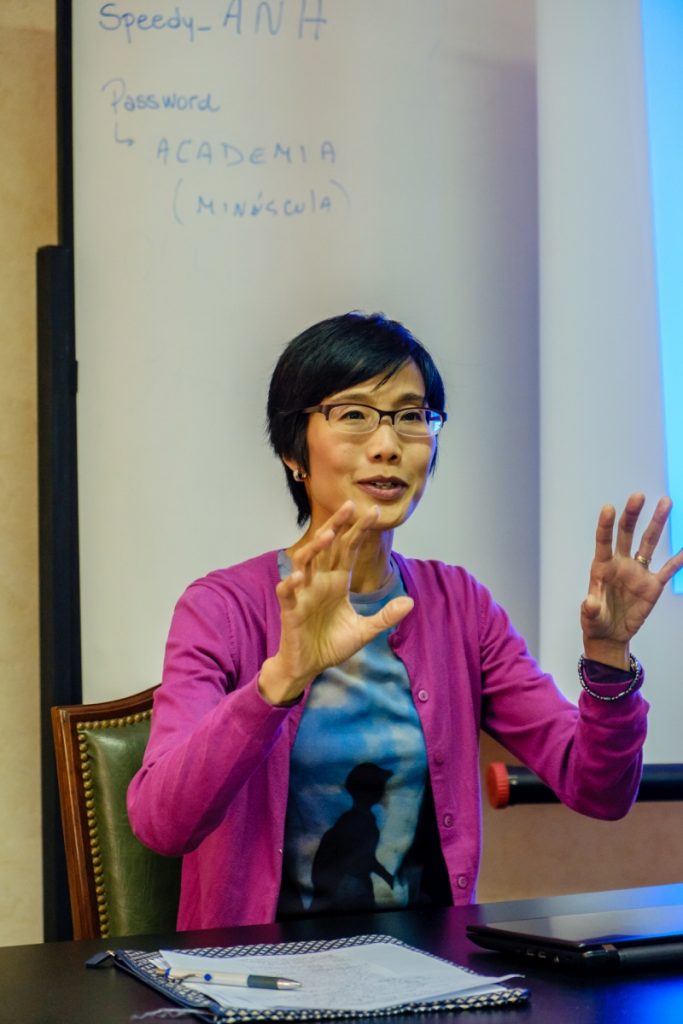
Abordando el tema específico del matrimonio, María Svetlana Camacho mostró como la influencia salmantina e hispana en Asia se deja sentir todavía en los siglos XVII y XVIII, cuando teólogos dominicos activos en Manila como Juan de Paz y Francisco Martínez responden a consultas matrimoniales que les hacen llegar diversas instituciones. Como mostró Camacho, ambos consultores tienen muy en cuenta la literatura sobre el matrimonio escrita en Salamanca en las décadas anteriores. Desde su punto de vista, estas consultas constituyen ejemplos de la aplicación y traducción a un contexto local del marco conceptual y normativo que regulaba el matrimonio en la España de la Modernidad Temprana. Mirando estas consultas de cerca se apreciaría, en concreto, la forma en la que opiniones dotadas de gran autoridad como las de Gregorio López, Tomás Sánchez o Solórzano Pereira –junto a otras muchas autoridades clásicas y de la escolástica europea- son reexaminadas a la luz de costumbres insulares sobre la dote radicalmente diversas a las tradiciones hispanas.
El matrimonio fue también la temática elegida por José Luis Egío para mostrar la forma en la que las lecturas de Vitoria o Soto sobre el IV de las Sentencias o las sumas de sacramentos redactadas por diversos autores de la Escuela de Salamanca fueron reevaluadas en el contexto novohispano. Egío se concentró en la obra Speculum coniugiorum, escrita por el fraile agustino Alonso de la Vera Cruz en la segunda mitad del siglo XVI. Como mostró Egío, empleando métodos y criterios para la resolución de casos aprendidos en Salamanca, Vera Cruz, que había tenido como maestros a Vitoria, Soto y Azpilcueta, rebate en varios casos las posiciones de sus maestros y de juristas salmantinos como Covarrubias. La actitud de Vera Cruz, ilustrativa de la de otros maestros formados en Salamanca y llegados a América como misioneros o juristas, nos permitiría hablar de la Escuela de Salamanca como una comunidad en la que materias y métodos de indagación resultan afines, pero en la que las respuestas a cuestiones concretas difieren, a menudo, ampliamente, siendo sus distintos integrantes más respetuosos con el contexto específico en el que operan que con las opiniones de maestros precedentes.
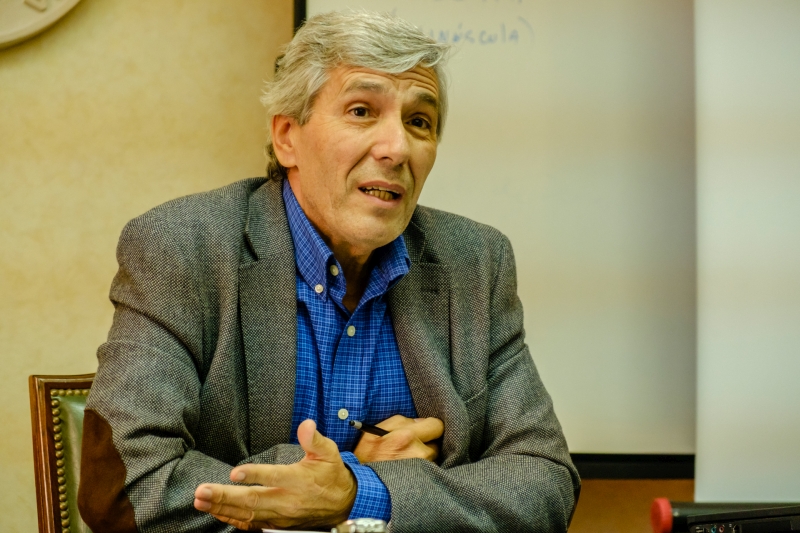
Otro bloque temático abordado en las Jornadas fue el de la esclavitud. El profesor Castilla Urbano, se concentró en mostrar la forma en la que en un marco de discusiones dominado inicialmente por la idea de que los amerindios eran esclavos por naturaleza (al modo aristotélico), se fue poco a poco imponiendo la idea de que existía una innegable homogeneidad entre naturales y europeos. Así, mientras que Vitoria todavía titubea en sus relecciones y cartas y no se pronuncia claramente sobre si la aparente amentia de los amerindios justificaba su esclavización o sometimiento a otro tipo de servidumbre, Soto, Las Casas o Cano descartan totalmente las justificaciones naturalistas de la esclavitud y se concentran en la casuística jurídica que autorizaba la esclavización y el sometimiento de individuos y poblaciones en determinadas circunstancias.
A continuación, Roberto Hofmeister Pich mostró como este marco conceptual y perspectiva general tuvo una enorme incidencia en las discusiones sobre la esclavitud negra que tuvieron lugar a finales del siglo XVI y durante el siglo XVII. En efecto, aunque la esclavitud negra constituye, sin duda alguna, uno de los cabos sueltos o problemáticas menos abordadas por los primeros maestros de la Escuela (Vitoria o Azpilcueta parecen justificar sin grandes miramientos la esclavización de los africanos), jesuitas como Luis de Molina o Diego de Avendaño –autores de amplias reflexiones sobre la esclavización de los negros y su comercialización interoceánica-, vuelven con frecuencia a las reflexiones de sus maestros sobre la primitiva esclavización de los amerindios para desarrollar una casuística mucho más amplia sobre los títulos que se alegaban en el contexto africano.
Como mostró Alfredo Culleton en la última intervención temática de las Jornadas, los escolásticos salmantinos activos en España y América no sólo intervinieron en las discusiones sobre la licitud y legitimidad del comercio de esclavos, sino que reflexionaron con prolijidad y un alto grado de originalidad sobre otros fenómenos característicos de la economía de su tiempo como la creciente inflación y pérdida de valor de la moneda. En este campo, autores como Martín de Azpilcueta, Tomás de Mercado (s. XVI) y Juan de Lugo (s. XVII) sopesan perspectivas objetivistas y subjetivistas anteriores sobre el precio de las mercancías y adoptan criterios en los que el marco conceptual elaborado por Vitoria en torno a la ley y el derecho (natural, divino, de gentes) resulta clave para actualizar progresivamente la doctrina moral a nuevas y problemáticas realidades económicas. Todo ello, sin abandonar el ideal normativo de un comercio supeditado a criterios objetivos de justicia.
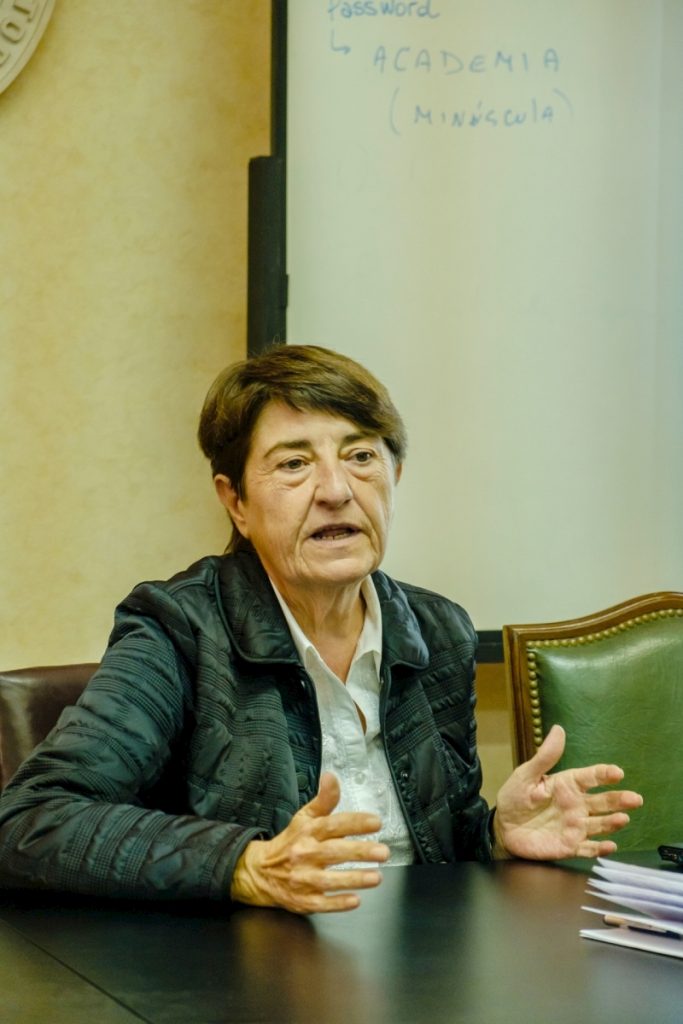
En las sesiones finales de las Jornadas se presentaron distintos proyectos de edición y difusión de fuentes de la Escuela de Salamanca. Francisca Hernández y Xavier Agenjo Bullón presentaron los planteamientos biblioteconómicos y bibliográficos de la Biblioteca Virtual de Polígrafos, en la que se incluye la Biblioteca Virtual de la Escuela de Salamanca–, un portal desde el que es posible acceder a fuentes bibliográficas sobre la Escuela dispersas en una multitud de bibliotecas digitales, así como a diferentes descripciones en Linked Open Data, incluida Wikidata, y estudios poligráficos sobre los escolásticos salmantinos elaborados por distintos especialistas académicos.
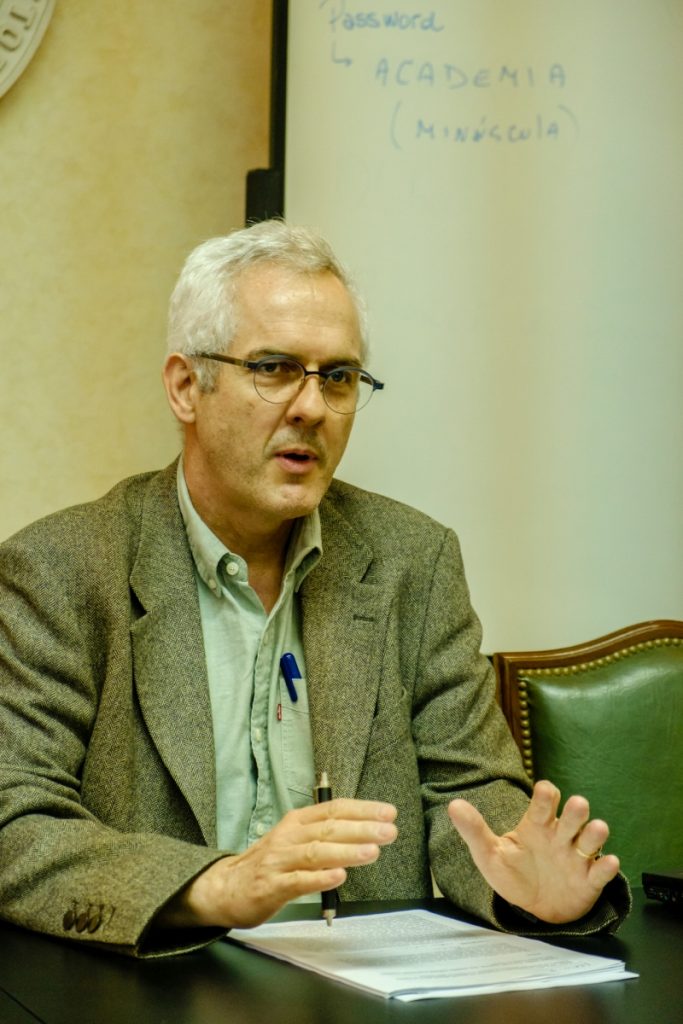
Jörg Tellkamp presentó el proyecto de traducción y edición de fuentes escolásticas novohispanas en alemán Quellen und Studien zu den Philosophen Neu-Spaniens, proyecto que en los próximos años contribuirá a que textos clave de autores como Vasco de Quiroga, Alonso de la Vera Cruz, Tomás de Mercado o Bartolomé de Ledesma estén disponibles en ediciones bilingües latín-alemán o castellano-alemán. El proyecto, concebido por Jörg Tellkamp, Christian Schäfer y otros investigadores de Alemania, España y México e impulsado por la editorial Winter de Heidelberg pretende facilitar, ante todo, que estos textos esenciales resulten accesibles y puedan ser conocidos por un público no especialista (por ejemplo, el estudiantado universitario alemán de Bachelor o Master), pero interesado en la historia del pensamiento jurídico y filosófico que se elaboró en la Primera Modernidad más allá del continente europeo.
Por último, Roberto Hofmeister Pich y Alfredo Culleton, co-directores del proyecto Scholastica colonialis, informaron sobre los últimos avances realizados en el marco de un proyecto que, desde hace una década, se concentra en rescatar en bibliotecas y archivos fuentes filosóficas elaboradas en Latinoamérica durante el período colonial. A la luz de lo expuesto por otros investigadores durante las Jornadas, Pich y Culleton reevaluaron los temas y enfoques que, de acuerdo a su perspectiva, resultan claves y específicos en la que denominan como escolástica colonial.
Además de las ponencias mencionadas, que fueron discutidas en un círculo cerrado formado por los distintos participantes en el evento, el jueves, 25 de octubre, tuvo lugar una presentación pública del proyecto La Escuela de Salamanca: una colección digital de fuentes y un diccionario de su lenguaje jurídico-político en la sala de plenos de la Academia Nacional de la Historia de la República Argentina, sede del Congreso Nacional Argentino entre 1864 y 1905. En compañía de miembros distinguidos de la Academia, Thomas Duve, Christiane Birr, David Glück y Andreas Wagner mostraron la selección de obras a editar por el proyecto, informaron de las características de las ediciones que impulsamos y presentaron las distintas modalidades en las que resulta posible ver los textos editados y buscar conceptos, lugares o autoridades en el corpus de fuentes. Durante este acto público, Andreas Wagner informó, asimismo, de los repertorios digitales que alberga la página web del Instituto Max Planck para la Historia del Derecho Europeo (colección De Indiarum Iure, con importantes obras de la historia del derecho en el espacio iberoamericano; tesis doctorales en Derecho del INHIDE bonaerense; revistas jurídicas alemanas de los siglos XVIII y XIX) y el papel que juegan las humanidades digitales en diversos proyectos de investigación del MPIeR (Diccionario Histórico de Derecho Canónico en Hispanoamérica y Filipinas, ss. XVI-XVIII; Repertorio de ordenanzas de policía; El gobierno de la Iglesia universal tras el Concilio de Trento; comparación de las ediciones del Manual de confesores de Martín de Azpilcueta, etc.).
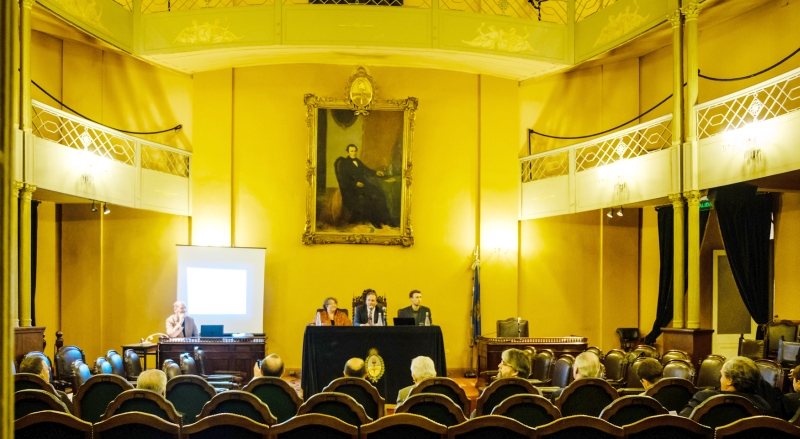
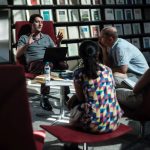
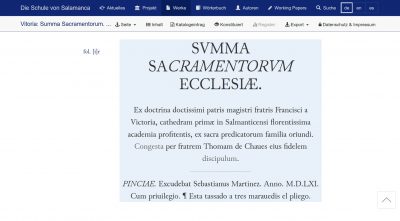
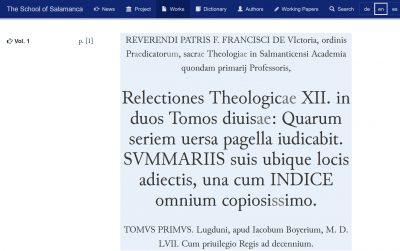

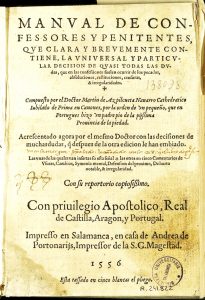 Referentin: Christiane Birr
Referentin: Christiane Birr








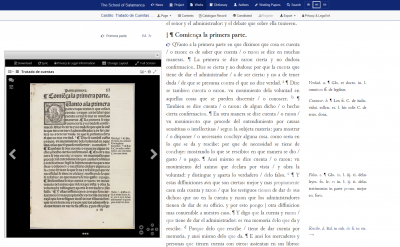 processing tools applicable to “low-resourced” languages such as early modern Spanish or Latin, or of linguistic and semantic resources appropriate for these specific periods and languages. Finally, while discussions about (textual) data representations and visualizations lie at the very heart of current digital humanities endeavours, there still is only rudimentary consensus about best practices in representing early modern texts and data in all their (multimedial/multimodal) variety in digital forms, as well as about their versioning, forms of readerly participation, underlying software architectures, etc.
processing tools applicable to “low-resourced” languages such as early modern Spanish or Latin, or of linguistic and semantic resources appropriate for these specific periods and languages. Finally, while discussions about (textual) data representations and visualizations lie at the very heart of current digital humanities endeavours, there still is only rudimentary consensus about best practices in representing early modern texts and data in all their (multimedial/multimodal) variety in digital forms, as well as about their versioning, forms of readerly participation, underlying software architectures, etc.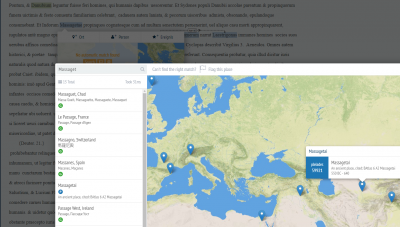
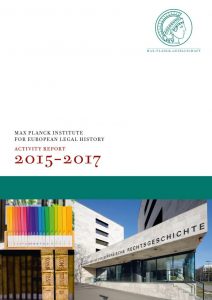
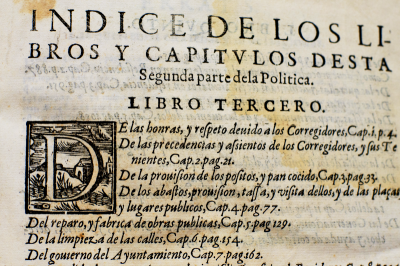
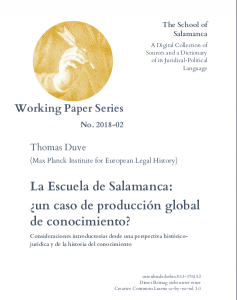
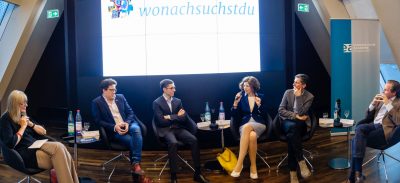 Die Gesprächsrunde war gut aufgelegt, und das Publikum hat viel gelernt – wie man Max-Planck-Direktor wird, was ein Rechtshistoriker eigentlich macht und welche Fragen die Gesprächsteilnehmer schon immer gern mal ihren Kolleginnen und Kollegen gestellt hätten. Das Gespräch ist für hr-info aufgenommen worden und wird zu einem späteren Zeitpunkt im Radio gesendet.
Die Gesprächsrunde war gut aufgelegt, und das Publikum hat viel gelernt – wie man Max-Planck-Direktor wird, was ein Rechtshistoriker eigentlich macht und welche Fragen die Gesprächsteilnehmer schon immer gern mal ihren Kolleginnen und Kollegen gestellt hätten. Das Gespräch ist für hr-info aufgenommen worden und wird zu einem späteren Zeitpunkt im Radio gesendet.